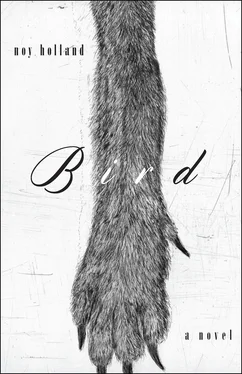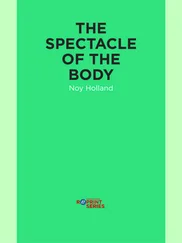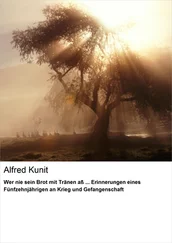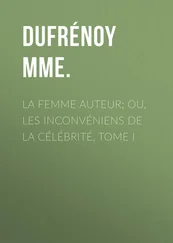He crossed herwrists behind her, walked her into the room. She was gowned in a towel from the tub, damp still, the day passing — cold, the green fuse blown. The city was flattened, looked to be; it was a poster of itself, grainy, famous in any light. He walked her where she could see it, where she could see the bridge, the man on a thread descending, his tiny pointed flame. She saw the hot blue bramble of welder’s sparks fizzing out over the river. Across the river: the fabulous city.
He had set screw eyes in the floor. The floor was grooved, adrift with hair, the deep tarry blue of the ocean. He trained the heater on a patch of floor to warm the boards she would lie on. He pulled the towel off, helped her down in stages, onto her knees, her back.
The boards were gummy; they smelled of paint. They smelled of his dog who leaked in her sleep. She let him tie her — wrist and wrist and ankles. As he wished. He arranged her as he wished. He spread out her hair like a headdress, tall, like grass the wind has knocked down. He turned her toes out. He turned her wrists up when he tied her.
Something small — a bird — several — wobbled, blown behind her, the flock a scattering of ash in the wind in the cold above the river, the barges moored. The garbage scow. He lifted her head, knotted the scarf at the back of her head, the scarf snug across her eyes, her mother’s scarf, across her mouth and nose. The scarf smelled of her mother. He trained the heater on her, and the cooling fan, oscillating, faint. He lit a candle, tipped it into the wind the fan made, and the wax blew hot, dispersing — sparkler, pod, nematocyst, a burn that lights and shrinks. He let the wax mound on the skin of her wrists — to mark the place, or seal it: here was the first place he touched her. Here was the mineral seep, the drip in a cave, the years passing. Here a notch — where the tendons of her neck knit into her chest and the wax would catch and pool. He said nothing. He scarcely touched her. Thrust into her once and walked out.
She heard him go. Two doors, the last stairs, hello on the stoop, he was gone.
A day a day: it passes. Gone: and not: and so again.
And so it passes. The last of the sun, a cooling wind. He was gone an hour, two, gone shopping. The only light in the room was the light of the street she could see through the scarf he had tied across her face and from the orange glow of the heater, round, a fallen moon, its motor humming. She heard rats plumping their nests in the walls and the creak of the beaten wings of birds falling out of the wind in the airshaft.
She waked, and knew by this that she had been sleeping. She had been flying her mother again on a ridge by a string like a kite. She could tell: she waked with her mother’s same question.
Who will die when I die?
It was Mickey’s question too.
She waked hungry. A baby cried, pushed down the street in a carriage. The wheels dropped into a crack in the street and the baby hiccupped.
“Whoops,” said the mother.
It was too late to be out. It was too late to creep through the sumac with them and throw a stick in the river. Too long — this. Prank. She wanted up.
A siren set out. Bird tried to sing: the one about old Dixie, a favorite of her mother’s, her mother newly dead, and Bird was alone in Brooklyn, and hot, and cold, and lashed to the floor by the man she loved and he was gone off from her and never coming home. She would starve here, freeze, she didn’t know which. Mickey was dead or dying, drowned. He had been struck down, murdered, ferried to the ER, ferried to the morgue. The sirens passed, dimming, quit.
Such a boy. A boy who knew his knots.
She smelled soup. Men and women all over the country were sitting down to soup. Coming home. Hello, mother.
“Get your boots off,” say the mothers, “get your coat.”
Bird wanted to say it too. A little habit. She wanted to tell him to take his boots off twice a day for fifty years. She wanted to sort his socks for him and soak the spots from his clothes. She’d make biscuits. Swore it. And she would never use his comb. Bird would never use his toothbrush. She would always keep the sink clean. She would always ask first. She would leave a light on. She would not eat all the popcorn. She would leave his hats alone.
There he was. That was the key in the lock, the doorknob jammed into the divot it had made in the plaster of the entry wall. He left his boots on.
She married another. Mothered another.
Come here.
She heard him moving — the long stride, he wore his boot-heels down, moving among the— ruins , she wants to say, rooms. She said his name once and nobody answered.
It was not him. It wasn’t like him.
Of course it was.
Her scalp fell away from her face; her brain dropped back in her head.
He brought her honey, the little bear warmed in his pocket. Lemon, he brought, and custard. Berries, asparagus, cream. He left the lights off, he took his time for a time. He meant to feed her first, he left the scarf on. “Guess. What’s your hurry?”
He fed her lilac. He fed her persimmon — she had no idea — a food like refrigerated satin. Saltines. Marmalade and corn-fed beef and puffy milky biscuits. Frozen beer. Bedroom food. “Be still. Be still.”
He would not be hurried. He turned the fan off. He turned the heater off. He wanted it quiet. He wanted them to hear. He slid his belt off, and swung the buckle across her mouth. “Say something,” he whispered.
“Welcome home.”
“You don’t quit.”
“Get this thing off,” she said. “I want to see.”
He pulled her scarf off. Mickey reached up and behind himself to bunch up his shirt at the collar.
It always took her, this simple act: the give in it, the show. How his chest broadened out, the wings went wide. The globe of muscle swelled out of his arm, glided away from his elbow: that. Simple act. A man undressing. Look. Look away. Any man is stronger than she is. Any freak on the street can take her — as he wishes, if he wishes. There is that. The fact of power; the fresh display.
And something more. He tugged his shirt up. He had to hang down his head to do it. He had to offer his neck, the hinge was open, the predator’s handle of bone. Pretty, how he gave himself to it. His back softened, curved.
“Stop,” she said. “I want to see.”
He had his shirt across his face, he couldn’t see. His arms were hung up, hanging down. He was wide open. She saw the shadowy scoop where his skull hooked in, a boy, just, tender, a girl dipping her hair in a stream. He would never be more lovely.
His face appeared. He looked down at her, his eyes near-white, boy-blue.
Something was wrong with him. He was weeping. The wind had torn up his hair.
“Mickey,” she said. She called him Bird sometimes, his name for her, mistaken. “Mickey, you came home.”
The day begins.Nothing will stop it.
The phone rings in the dark. Word finds its way along — no matter how far out you live, no matter what you say.
For years now, Bird has said it, for all the years since she has seen Mickey, all the things she has thought to say.
“I wish you’d stop,” Bird says.
But this is Suzie. Newsy Suzie. Her voice high and bright.
“It’s me.”
“Me too,” Bird says. “I was sleeping. You have no fucking clue.”
What Suzie has is the next word on Mickey. She has a new name to give Bird. She has had the names down the years, a trade sometimes. Beatrice. Once a dancer, Brigitte, a girl who painted. Rosemarie. Country girls, exotics. Clara, Angelina, Racine.
Читать дальше












